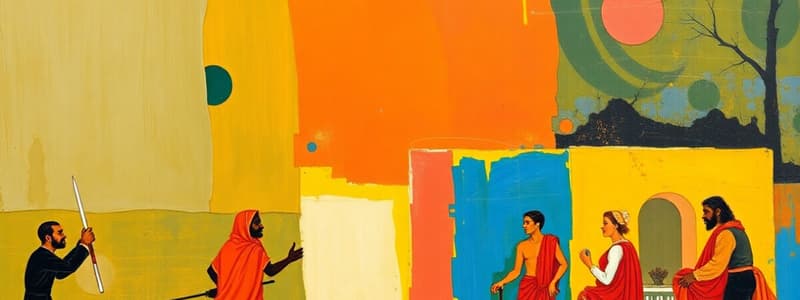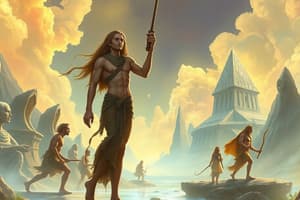Podcast
Questions and Answers
Match the following terms with their descriptions:
Match the following terms with their descriptions:
Paleolithic era = Characterized by the use of stone tools and a hunter-gatherer lifestyle Agricultural Revolution = Shift from hunting and gathering to farming and animal domestication Patriarchy = System where men hold power over women Pastoral society = Society relying primarily on animal husbandry
Match the following religions with their key concepts:
Match the following religions with their key concepts:
Hinduism = Belief in karma and reincarnation Buddhism = Focus on achieving enlightenment through meditation Judaism = Emphasis on the Torah and covenant with God Confucianism = Moral conduct based on filial piety
Match the following philosophical movements with their principles:
Match the following philosophical movements with their principles:
Daoism = Living in harmony with nature Theravada Buddhism = Emphasis on individual effort in achieving enlightenment Mahayana Buddhism = Incorporating bodhisattvas and compassion Bhakti movement = Emphasis on personal piety and worship
Match the following historical figures with their contributions:
Match the following historical figures with their contributions:
Signup and view all the answers
Match the following texts or scriptures with their respective religions:
Match the following texts or scriptures with their respective religions:
Signup and view all the answers
Match the following social structures or concepts with their characteristics:
Match the following social structures or concepts with their characteristics:
Signup and view all the answers
Match the following periods with their defining features:
Match the following periods with their defining features:
Signup and view all the answers
Match the following religious practices with their affiliations:
Match the following religious practices with their affiliations:
Signup and view all the answers
Match the following religious leaders with their religions:
Match the following religious leaders with their religions:
Signup and view all the answers
Match the following concepts with their associated regions:
Match the following concepts with their associated regions:
Signup and view all the answers
Match the following figures with their contributions or roles:
Match the following figures with their contributions or roles:
Signup and view all the answers
Match the following Islamic concepts with their descriptions:
Match the following Islamic concepts with their descriptions:
Signup and view all the answers
Match the following geographical trade routes with their defining features:
Match the following geographical trade routes with their defining features:
Signup and view all the answers
Match the following terms related to Islam with their meanings:
Match the following terms related to Islam with their meanings:
Signup and view all the answers
Match the following historical figures to their associated faiths:
Match the following historical figures to their associated faiths:
Signup and view all the answers
Match the following religious texts with their associated religions:
Match the following religious texts with their associated religions:
Signup and view all the answers
Match the following individuals with their notable actions:
Match the following individuals with their notable actions:
Signup and view all the answers
Match the following routes with their economic impacts:
Match the following routes with their economic impacts:
Signup and view all the answers
Match the following Islamic practices with their teachings:
Match the following Islamic practices with their teachings:
Signup and view all the answers
Match the following historical contexts with their relevant events:
Match the following historical contexts with their relevant events:
Signup and view all the answers
Study Notes
Early Human History and Civilization
- Paleolithic Era: A period from 2.5 million years ago to 10,000 BCE, characterized by stone tools and hunter-gatherer lifestyles.
- Agricultural Revolution: A pivotal shift starting around 10,000 BCE, introducing farming and animal domestication, marking a transition from hunter-gatherer societies.
- Pastoral Societies: Societies based on animal herding and husbandry for survival.
Major Religions and Philosophies
- Hinduism: An ancient Indian religious tradition, emphasizing Brahman (ultimate reality), reincarnation, karma, and a diverse pantheon of deities.
- Upanishads: Hindu sacred texts (800-400 BCE) exploring philosophical and spiritual concepts, focusing on Brahman.
- Siddhartha Gautama (the Buddha): Founder of Buddhism, achieving enlightenment through meditation and teaching the Four Noble Truths to end suffering.
- Theravada Buddhism: A branch emphasizing the original Buddha's teachings, monastic life, and individual effort towards enlightenment.
- Mahayana Buddhism: A branch emphasizing compassion and enlightenment accessibility, incorporating bodhisattvas and a more adaptable path to liberation.
- Bhakti Movement: A Hindu devotional movement emphasizing personal piety, love, and reverence for specific deities.
- Confucianism: A Chinese philosophy promoting social harmony, good governance, moral conduct (based on filial piety), and respect for elders.
- Daoism: A Chinese philosophy emphasizing harmony with nature, following the Dao (natural order), and seeking balance and tranquility.
- Judaism: An ancient Middle Eastern religion emphasizing belief in one God (Yahweh), the Torah (Jewish scriptures), and the covenant with the Jewish people.
- Jesus of Nazareth: A Jewish teacher considered the Messiah and Son of God by Christians, preaching love, compassion, forgiveness.
- Saint Paul: A key figure in early Christianity, converting and acting as a missionary, advocating faith openness to all.
- Perpetua: An early Christian martyr with a diary documenting her imprisonment and execution, highlighting faith's fortitude against persecution.
- Muhammad: The founder of Islam, receiving revelations from God (forming the Quran), and advocating monotheism, social justice, and submission to Allah.
- Quran: The sacred text of Islam, believed to be God's revelations to Muhammad, outlining faith, morality, law, and ritual.
- Umma: The community of Muslims, emphasizing shared faith and identity transcending tribal and national boundaries.
- Ulama: Islamic scholars acting as interpreters, teachers, and religious authorities.
- Sharia: Islamic legal system derived from the Quran and Muhammad's teachings, governing various aspects of life.
- Madrassas: Formal Islamic colleges (especially higher education for Islamic law, theology, and religious studies).
- Sufism: A mystical branch of Islam emphasizing inner spiritual experiences, personal relationships with God, and union with the Divine.
Ancient Trade Routes
- Silk Roads: A network of trade routes connecting East and West (especially China and the Mediterranean).
- Sea Roads: Trade routes connecting the South China Sea, Indian Ocean, and East African coast.
- Sand Roads: Trade routes across the Sahara Desert linking North Africa to the Mediterranean and West Africa.
Studying That Suits You
Use AI to generate personalized quizzes and flashcards to suit your learning preferences.
Description
Explore the foundational aspects of early human civilization, from the Paleolithic Era to the Agricultural Revolution. Delve into major religions and philosophies including Hinduism and Buddhism, their teachings, and sacred texts. This quiz will test your knowledge on the evolution of societies and belief systems.



